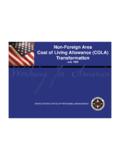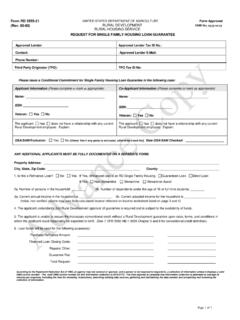Transcription of New IRS Advice on Taxability of Gift Cards Treatment of ...
1 Contents FSLG Releases Updated Publication 963 New IRS Advice on Taxability of Gift Cards New Notification Requirement for State and Local government New Hires Treatment of Employer-Provided Lodging IRS Revises Form for Tax-Exempt Bonds FSLG Directory Contributors Marilee Basaraba Katherine Dees Edie Lee Michael Muratore Stewart Rouleau Norma Steele FSLG RELEASES REVISED EDITION OF PUBLICATION 963 BY STEWART ROULEAU, FSLG SENIOR ANALYST The Office of Federal, State, and Local Governments has completed an on-line revision of Publication 963, Federal-State Reference Guide. Publication 963, last revised in 2002, is a comprehensive guide to social security, Medicare, and retirement plan coverage for government employers. The first edition appeared in 1997, as a joint effort of the Internal Revenue Service, the Social Security Administration, and the National Association of State Social Security Administrators.
2 It contains a thorough discussion of Section 218 of the Social Security Act and how it applies to different governmental entities in various situations, with many illustrations of the application of coverage rules. The publication also discusses employment tax and fringe benefit issues of interest to government entities, and provides information and points of contacts for the Internal Revenue Service, the Social Security Administration, and the National Association of State Social Security Administrators. Although the IRS does not plan to make printed copies available for distribution, any or all of Publication 963 can be downloaded from the FSLG web site, The on-line format will enable FSLG to make updates to the information periodically, and will allow taxpayers immediate access to these updates. Numerous links are provided in the text to related web pages and sources. A limited number of printed copies of the 2002 edition remain available from the National Distribution Center.
3 You can order it by calling 1-800-829-3676. While most of the information in the 2002 edition is correct, you should check the 2005 revision for changes, particularly to procedures and contact information. NEW IRS Advice ON Taxability OF GIFT Cards BY MARILEE BASARABA, FSLG SPECIALIST (PACIFIC) Many employers give employees birthday or holiday gifts. These gifts take a variety of forms including a turkey, a ham, a gift basket, or a coupon to purchase a turkey or a ham at a local grocery store. In recent years, the gift card has been a popular alternative because it provides employees with more choices and greater convenience. Some employers believe that gift Cards are not taxable and qualify as excludable from income as a de minimis fringe benefit because they meet the example of traditional birthday or holidays gifts of low fair market value , or because they are non-negotiable (restricted to only certain items; the redemption time is limited; and any unused portion is forfeited).
4 However, Federal tax law does not view giving an employee a turkey or a ham as the equivalent of giving an employee a gift card to purchase a turkey or a ham. A recently issued Tax Advice Memorandum (TAM) in 2004 clarifies the tax law and discusses this issue. In order for a fringe benefit to be excludable as a de minimis fringe benefit, it must be a property or service that is small in value, infrequent, and administratively impracticable. The TAM determined that an employer-provided thirty-five dollar holiday gift coupon that is redeemable at several local grocery stores is not excludable from income as a de minimis fringe benefit. The IRS findings states that the gift coupon operates in the same way as a gift certificate which is considered a cash equivalent. Cash equivalents are never excludable as a de minimis fringe benefit. The example in Reg. (a) of holiday gifts is limited to property; it does not include cash (except for special rules that apply to transit passes and/or occasional meal money).
5 The same regulation states that cash is not excludable even when it is provided to purchase a property or service that, if provided in kind, would be excludable as de minimis. The example given in the regulation refers to an employer providing cash to purchase a theater ticket to the employee; whereas, if the employer gave the employee the theater ticket it would be excludable as a de minimis fringe benefit. The Service holds that the statute provides the basis for the exclusion , wherein the regulations describe examples of fringe benefits that are potentially excludable assuming all of the other requirements of the statute are met. Because gift Cards , certificates, and/or coupons are considered cash equivalents, they do not meet the statute requirements to be excludable. Furthermore, the value of the coupons was determinable and the frequency to individual employees was ascertainable - all requirements that must be met in order for the coupons to be excluded from income.
6 The TAM does not address a dollar threshold to establish a standard for the meaning of small in value. However, we can look at other tax law for guidance. A 1959 revenue ruling states that the value of a turkey or a ham is considered nominal or small in value. A 2000 legal memorandum states that non-monetary recognition awards having a fair market value of $100 did not qualify as de minimis fringes and are considered wages. So, if an employer provides a turkey, a ham, or other property of nominal value to employees, the value of these items is not considered wages or salary and is excludable from income. But if an employer provides gift Cards , certificates, or coupons to purchase a turkey, ham, or other nominal value property, these are considered wages and are subject to income and employment taxes (even when the card restricts the items purchased, the time to use the coupon, and any unused portion is forfeited) because cash equivalents do not meet the de minimis fringe benefit requirements.
7 NEW NOTIFICATION REQUIREMENT FOR STATE AND LOCAL government NEW HIRES BY EDIE LEE, SOCIAL SECURITY ADMINISTRATION Section 419(c) of the Social Security Protection Act of 2004 (PL 108-203) contains a provision requiring state and local government employers to provide a statement to employees hired January 1, 2005, or later in a job not covered under social security. The statement explains how a pension from that job could affect future social security benefits to which they may become entitled. Form SSA-1945, Statement Concerning Your Employment in a Job Not Covered by Social Security, is the document that employers should use to meet the requirements of the law. The SSA-1945 explains the potential effects of two provisions in the social security law for workers who also receive a pension based on their work in a job not covered by social security. The Windfall Elimination Provision can affect the amount of a worker's social security retirement or disability benefit.
8 The government pension Offset Provision can affect a social security benefit received as a spouse or an ex-spouse. Under the Windfall Elimination Provision, a worker's social security retirement or disability benefit is figured using a modified formula when he/she is also entitled to a pension from a job where he/she did not pay social security tax. As a result, the worker will receive a lower social security benefit than if he/she was were not entitled to a pension from this job. Under the government pension Offset Provision, any social security spouse or widow(er) benefit to which a person becomes entitled will be offset if he/she also receives a Federal, state or local government pension based on work where he/she did not pay social security tax. The offset reduces the amount of a person's social security spouse or widow(er) benefit by two-thirds of the amount of his/her pension . For more detailed information about the new legislative requirement, and to view a copy of Form SSA-1945, see This website also contains links to more detailed information about the Windfall Elimination Provision and the government pension Offset Provision.
9 Treatment OF EMPLOYER-PROVIDED LODGING BY KATHERINE DEES, FSLG SPECIALIST (WESTERN) Providing free or discounted housing to an employee may be an important recruitment tool for employers. This benefit may enable employers to attract employees who would otherwise be unavailable. For example, many rural school districts have a problem attracting and maintaining quality teachers. To accomplish this, they frequently offer teachers free or discounted housing as incentives. However, this may lead to a taxable fringe benefit. Fringe benefits are fully taxable under Internal Revenue Code (IRC) Section 61, unless specifically excluded by law. In general, the amount that must be included in the employee's gross income is the amount by which the fair market value (FMV) of the benefit exceeds the amount the employee paid after taxes for the benefit, less any amount the law excludes. In general, this rule applies to employer-furnished housing.
10 Example 1: A school district gives a teacher free housing. Based on comparable property in the area, it has a fair rental value of $600 per month. Based on these facts, the school should be including $600 in the teacher's income per month. Example 2: A school district gives a teacher discounted housing. Based on comparable property in the area, it has a fair rental value of $400 per month. The teacher is paying the school $250 per month to rent the house. Based on these facts, the school should be including $150 in the teacher's income per month. There are no specific required techniques for establishing the FMV, but common methods would include checking the local newspaper and finding the FMV of comparable rental property or calling a realtor and getting comparable rental value on similar real estate. The employer must determine the value of the fringe benefits provided to the employee no later than January 31 of the following year in order to report the value on the employee's Form W-2.














